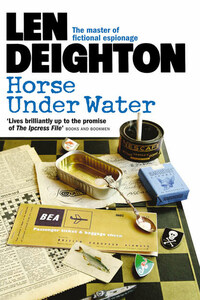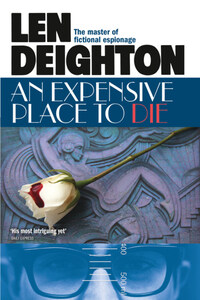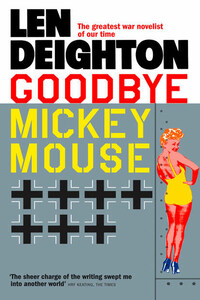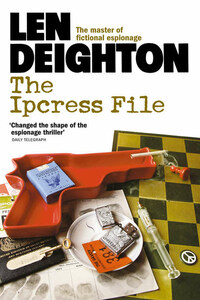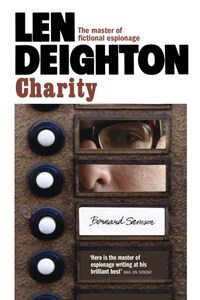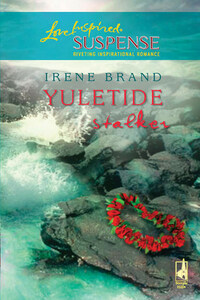Wishing to continue the notion of Bernard Samson spying through windows or doors, I took the author’s very good suggestion of having the book’s protagonist peering through a glass public house window. I found a perfect example among my collection of photographs that I had taken of windows, this one from a London pub. Combined with the title of this book, Hope, it conjures up the saying “last chance saloon”, in which there is always hope, even for an ageing spy who is on the ropes in both his career and his love life!
For the back cover, I placed a china souvenir of London’s Tower Bridge on a map of divided Berlin and straddled it across the Berlin Wall, which I likened to the River Thames. As readers of this series will by now know, London has exported something – or rather someone – more precious than a souvenir to the Eastern side of the Berlin Wall, and our Bernard still lives in hope of returning them to the West.
At the heart of every one of the nine books in this triple trilogy is Bernard Samson, so I wanted to come up with a neat way of visually linking them all. When the reader has collected all nine books and displays them together in sequential order, the books’ spines will spell out Samson’s name in the form of a blackmail note made up of airline baggage tags. The tags were drawn from my personal collection, and are colourful testimony to thousands of air miles spent travelling the world.
Arnold Schwartzman OBE RDI
This novel is entirely a work of fiction.
The names, characters and incidents portrayed in it are the work of the author’s imagination. Any resemblance to actual persons, living or dead, events or localities is entirely coincidental.
Published by HarperCollinsPublishers Ltd
1 London Bridge Street
London SE1 9GF
www.harpercollins.co.uk
This paperback edition 2011
First published in Great Britain by
HarperCollinsPublishers 1995
HOPE. Copyright © Len Deighton 1995.
Introduction copyright © Pluriform Publishing Company BV 2011.
Cover designer’s note © Arnold Schwartzman 2011. All rights reserved under International and Pan-American Copyright Conventions. By payment of the required fees, you have been granted the nonexclusive, nontransferable right to access and read the text of this e-book on-screen. No part of this text may be reproduced, transmitted, downloaded, decompiled, reverse-engineered, or stored in or introduced into any information storage and retrieval system, in any form or by any means, whether electronic or mechanical, now known or hereinafter invented, without the express written permission of HarperCollins e-books.
Len Deighton asserts the moral right to be identified as the author of this work
A catalogue record for this book is available from the British Library
ISBN: 9780007395750
EBook Edition © MAY 2011 ISBN: 9780007395798
Version: 2017-08-10
Cover designer’s note
Copyright
Introduction
1
A caller who wakes you in the small dark silent…
2
September is the time many visitors choose to visit Poland.
3
Dicky was silent for much of the time we were…
4
The following day brought no further news of either George…
5
‘You haven’t told me what it’s like in Warsaw these…
6
‘What a lovely idea – to take the children to see…
7
‘Your wife loathes me,’ said Gloria. ‘She won’t be happy…
8
‘Hold on, Bernard, hold on. I’m just a simple old…
9
After my bruising encounter with Theo’s son I went to…
10
I awoke in the middle of the night, bathed in…
11
What Lisl called ‘the flashy new American hotel’ was really…
12
Now Poland was truly in the grip of winter. My…
13
‘Don’t do this to me, Bernard,’ said George.
About the Author
Other Books by Len Deighton
About the Publisher
In 1945 Europe was devastated. Food was scarce and bitter hatred was in the air. Parts of France, Belgium, Holland and the western half of Germany was battered but the vast area of land over which the Red Army had advanced was now largely rubble, a barren wasteland where millions of ‘displaced persons’, undernourished, infirm and undocumented, wandered in confusion.
Stalin ordered his Red Army to cling tight to all their gains. His promises made to Prime Minister Churchill and President Roosevelt, that the people of Eastern Europe would be allowed free elections, were ignored. The nations of Eastern Europe became satellites of Russia, ruled by expatriates who had been tutored in Moscow. Red Army soldiers complete with tanks and artillery remained in evidence everywhere.
With American generosity, programs such as the ‘Marshall Plan’ slowly revived the countries of Western Europe. But American hopes for a revised and truly democratic Russian political system faded as Moscow exerted its brutal power at home and abroad. An Iron Curtain had come down between the nations of the West and those in the East, and there was no reconciliation. Russia’s military occupation zone was the eastern half of Germany and its heartless rule was fuelled by memories of the barbaric German violation of the Russian Motherland.
In the summer of 1961 the communists built a wall to surround the Western Sector of Berlin. It was, said Nikita Khrushchev, the Russian Premier, ‘a barrier to Western Imperialism’. Anyone in the East trying to take a closer look at Western Imperialism was likely to be shot. Hundreds were killed in attempts to get to the West and the East German border guards were given commendations and bonus payments for killing escapers.

